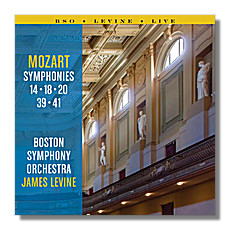
The Internet's Premier Classical Music Source
Related Links
- Mozart Reviews
- Latest Reviews
- More Reviews
-
By Composer
-
Collections
DVD & Blu-ray
Books
Concert Reviews
Articles/Interviews
Software
Audio
Search Amazon
Recommended Links
Site News
 SACD Review
SACD Review
Wolfgang Mozart

Symphonies
- Symphony #14, K. 114
- Symphony #18, K. 130
- Symphony #20, K. 133
- Symphony #39, K. 543
- Symphony #41 "Jupiter", K. 551
Boston Symphony Orchestra/James Levine
BSO Classics SACD 1001/02 2SACDs Hybrid Multichannel
Although he's primary known as both an opera conductor and champion of new music, James Levine has made the Mozart symphonies a major part of his career. He recorded the complete canon in Vienna for Deutsche Grammophon, then led the Chicago Symphony in forgotten performances on RCA. Both are available via ArkivMusic's reissue program, but these beautiful Boston performances are a wonderful choice for anyone who likes "traditional" Mozart.
While Levine's Boston tenure was heavily cut into by serious health concerns, culminating in his 2011 resignation, he was credited with expanding the repertoire of the orchestra substantially. All the more curious then that we should have these Classical-era masterpieces to remember him by. Disc one holds three early symphonies, charming and elegant by turns. Levine's mastery of the composers' operatic output is in evidence here. Strings are full, yet also incisive and clean with attacks. Continuo is used tastefully, and while not to be confused with period-practice, the tempos are lively and the Boston players are light on their feet. While not especially memorable, Mozart's early symphonic works are very well crafted, and are full of great melody. The Boston Symphony has always had warmly singing brass and very "French" winds. That tradition is proudly upheld.
Disc two is more substantial, but somewhat less successful. The performances are heavier, lacking the exceptional clarity and flow found in the early works. In certain places, winds and brass aren't as warm or bright as previously. I'm well aware that Mozart's last symphonies ought sound different than his first, but I miss some of the fun and discovery that Levine conveyed on disc one. I find the forward-looking "Jupiter Symphony" the more convincing of the two pieces here, despite the fact that this is Levine's third recording of the work. In the Symphony #39, the opening movement simply lacks that last ounce of panache, while the latter three are very good and reasonably timed, but the work as a whole doesn't convince. And that's perhaps the biggest problem with the second half of this release, a lack of consistency. In the early works, Levine appears to have a clear vision for these symphonies. In the later ones, I feel that the maestro is a touch inconclusive about which direction he wishes to go. Ultimately though, this lovely pair of discs is a fine tribute to a relationship cut short, and a timely reminder of Levine's love of Mozart.
Copyright © 2014, Brian Wigman


















